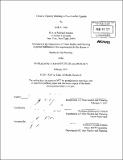| dc.contributor.advisor | Bishwapriya Sanyal. | en_US |
| dc.contributor.author | Taha, Kofi A. (Kofi Abdul Malik) | en_US |
| dc.contributor.other | Massachusetts Institute of Technology. Dept. of Urban Studies and Planning. | en_US |
| dc.coverage.spatial | f-ug--- | en_US |
| dc.date.accessioned | 2011-06-06T17:45:26Z | |
| dc.date.available | 2011-06-06T17:45:26Z | |
| dc.date.copyright | 2011 | en_US |
| dc.date.issued | 2011 | en_US |
| dc.identifier.uri | http://hdl.handle.net/1721.1/63238 | |
| dc.description | Thesis (M.C.P.)--Massachusetts Institute of Technology, Dept. of Urban Studies and Planning, 2011. | en_US |
| dc.description | Cataloged from PDF version of thesis. | en_US |
| dc.description | Includes bibliographical references (p. 49-51). | en_US |
| dc.description.abstract | Creative Capacity Building (CCB) is a methodology that emphasizes the ability of people living in poverty to create livelihood technologies, i.e., machines and tools that increase income, improve health and safety, decrease manual labor or significantly save time. By distilling key elements of the design process into a hands-on curriculum that is accessible to any educational level, and relying upon the principles of participatory development and appropriate technology, CCB promotes a democratic framework for the application of technology in development that encourages people to become active creators of technology, not just recipients or users of technology. This thesis describes my personal experiences developing and implementing this new approach with Amy Smith, Director of D-Lab @ MIT, in several post-conflict communities in Northern Uganda. The principle claims of this paper are: 1) by emphasizing local participation and innovation, CCB is software for the hardware of Appropriate Technology 2.0, an updated and strengthened version of the appropriate technology movement that is no longer in favor in development circles; 2) the CCB curriculum is not effective as a stand alone intervention and requires a broader methodology that includes ongoing trainings, resources and venues that develop local capacity; 3) CCB also requires a reinterpretation of the role of the development professional from that of an external, "expert consultant" to a self-reflective participant and facilitator that enhances the abilities of others to transform their own lives and communities 4) the positive impact of every technology intervention, including CCB, is contingent upon successful navigation of the local setting-- in particular the cultural, political, economic, organizational and interpersonal dynamics that affect implementation; and 5) the ethics embedded in CCB have provided me with a framework for a personal theory of practice and a practice of action that prioritizes engagement in short-term poverty elimination strategies over long-term economic or political strategies, and that embraces the vulnerability that is required to bear witness, to reflect, to practice mindfulness in working and interacting with people, and to always maintain hope. | en_US |
| dc.description.statementofresponsibility | by Kofi A. Taha. | en_US |
| dc.format.extent | 91 p. | en_US |
| dc.language.iso | eng | en_US |
| dc.publisher | Massachusetts Institute of Technology | en_US |
| dc.rights | M.I.T. theses are protected by
copyright. They may be viewed from this source for any purpose, but
reproduction or distribution in any format is prohibited without written
permission. See provided URL for inquiries about permission. | en_US |
| dc.rights.uri | http://dspace.mit.edu/handle/1721.1/7582 | en_US |
| dc.subject | Urban Studies and Planning. | en_US |
| dc.title | Creative capacity building in post-conflict Uganda | en_US |
| dc.title.alternative | CCB in post-conflict Uganda | en_US |
| dc.type | Thesis | en_US |
| dc.description.degree | M.C.P. | en_US |
| dc.contributor.department | Massachusetts Institute of Technology. Department of Urban Studies and Planning | |
| dc.identifier.oclc | 726709999 | en_US |
